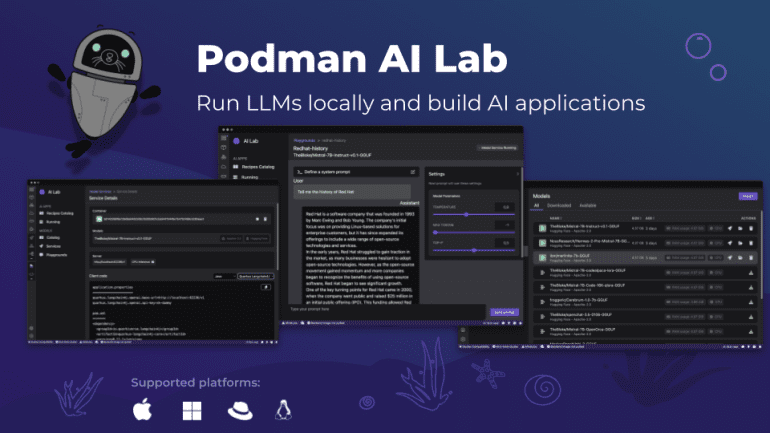- Red Hat introduces Podman AI Lab extension for seamless integration of generative AI into containerized applications.
- Extension simplifies AI development in local environments, facilitating adoption of generative AI for innovative applications.
- Detailed installation instructions available at developers.redhat.com for easy accessibility.
- Synergizes with Podman Desktop, offering intuitive container and Kubernetes management interface.
- Features “recipe catalog” with sample applications covering various LLM use cases, from chatbots to text summarizers and code generators.
- Includes audio-to-text transcription feature for automating spoken language conversion.
- Offers playground environment for real-time model interaction and learning.
Main AI News:
In a bid to foster developer engagement with cutting-edge artificial intelligence technologies, Red Hat introduces the Podman AI Lab extension, designed to seamlessly integrate generative AI capabilities into containerized applications. Unveiled on May 7, Podman AI Lab represents a pivotal stride in streamlining AI development within local environments. Red Hat emphasizes that this extension simplifies the incorporation of generative AI, empowering developers to craft sophisticated applications or refine workflows through AI-augmented methodologies.
Aligned with Red Hat’s commitment to developer enablement, Podman AI Lab serves as a conduit for embracing the potential of generative AI. By leveraging this extension, developers can harness the transformative power of AI to propel innovation and drive efficiencies in application development. Detailed installation instructions for Podman AI Lab extension are available at developers.redhat.com, ensuring accessibility and ease of adoption for developers seeking to explore AI-driven development paradigms.
Podman AI Lab synergizes seamlessly with its companion tool, Podman Desktop, offering developers an intuitive interface for managing containers and Kubernetes within local environments. With an array of features at their disposal, developers can navigate effortlessly between containerized environments while leveraging the prowess of generative AI.
At the heart of Podman AI Lab lies a comprehensive “recipe catalog” featuring a diverse range of sample applications tailored to expedite developer onboarding. These applications encapsulate various use cases for Large Language Models (LLMs), ranging from chatbots for simulating human-like conversations to text summarizers facilitating content creation and curation. Furthermore, developers can explore code generators designed to streamline higher-level design processes and object detection capabilities that empower applications to identify digital objects within images or videos. Noteworthy among the showcased applications is the audio-to-text transcription feature, which automates the conversion of spoken language into written text, augmenting accessibility and efficiency in data processing workflows.
In addition to serving as a repository of sample applications, Podman AI Lab boasts a dynamic playground environment where developers can interact with models in real-time, gaining insights into their behavior and performance characteristics. This immersive learning environment empowers developers to experiment, iterate, and refine AI-driven applications, fostering a culture of continuous learning and innovation.
As organizations increasingly pivot towards AI-driven development paradigms, the launch of Podman AI Lab underscores Red Hat’s unwavering commitment to empowering developers with the tools and resources needed to thrive in an AI-centric landscape. By democratizing access to generative AI capabilities, Red Hat aims to catalyze innovation and foster the creation of intelligent, data-driven applications that redefine industry standards and drive business value.
Conclusion:
The launch of Red Hat’s Podman AI Lab signifies a pivotal advancement in developer enablement within the AI landscape. By providing seamless integration of generative AI capabilities into containerized applications, Red Hat not only simplifies AI development but also empowers developers to innovate and create intelligent, data-driven solutions. This move reflects a strategic commitment to democratizing access to AI technologies, positioning Red Hat as a key player in driving industry innovation and transformation.

